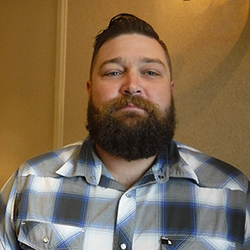PRESIDENT’S MESSAGE

By / Shaun Ekert
How many times have you been somewhere casual—in the elevator at work, picking up the kids at school, braving the line- up in the grocery store—and someone you know nods and asks,
“Hey, how’s it going?” We almost always answer the same way: “I’m good.”
Ignoring the fact that “good” isn’t a feeling but a judgement, I want to look at why we owe more to people and ourselves than a generic brushing-off of their interest, especially in the business world. We live in a world that gets more technologically connected and less emotionally connected by the minute—the least we could do is give people a genuine answer. When instead of saying, “Good” we give an honest comment about how we are feeling, how things are going, or the status of our place in the world, we engage others. More importantly, we engage them in a moment of vulnerability because we are offering up a personal moment for examination. Through that we form connections.
Consider this in the workplace. The proliferation of large companies and diverse markets leaves people hungry for personal connections. Having insight into something is like a light in the dark, a beacon towards the correct and reliable path. This is why recommendations are a trusted source of advice— someone you know had an actual, real-time experience with something and is able to share their first-hand opinions. That is powerful. The same goes for genuine comment or reaction to inquiries about our projects, work, and even mental health. If things are rough and all we say is “Good” how are we going to bring others past that casual line of questioning and into a place where others can help if we need it or offer encouragement if things are going well?
Going into a client or supervisor meeting saying things are going well when they aren’t passes by an opportunity to learn. As a leader, hearing things are going well but seeing later that the numbers indicate otherwise brings about the stark realization that the opportunity to help is gone. When things are great and we say so, we might receive encouragement or an invitation to discuss further so we can offer solutions to others.
It’s alright to say there is a problem because the specs aren’t right or because labour quality isn’t great right now. Obviously, you still have to use caution and reasonable boundaries in these interactions, but the point is that being vulnerable isn’t a sign of weakness—it’s a sign of authenticity. Being authentic garners respect and strength helps you grow your personal “brand” until it is you people seek out for help, advice, or feedback.
To make authenticity a valuable offering, employers need to give individuals the space, support, and tools they need to reach out and grow that sense of genuineness. If they start to foster an environment where employees can be successful in their day- to-day interactions and develop a strong, personal brand, this becomes a benefit to the company.
Of course, changing our habits is never easy. Association involvement is a good place to begin. It is a pressure-free, diverse environment with individuals from all aspects of the industry coming together to learn from, assist, and network with others. It is the ideal place to try on being vulnerable and respected in a trusted space. Everyone is part of the association because they truly want to be and see the benefits of camaraderie and simply being who you are. What could be better? ▪


